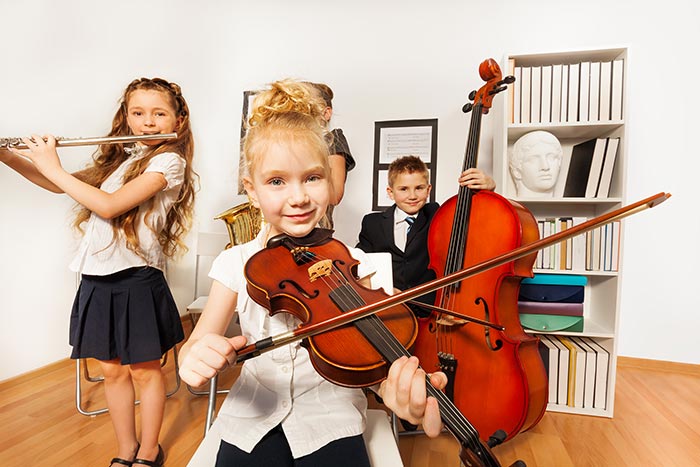In exploring the potential impact of music lessons on a child’s intelligence, a fascinating interplay between art and cognitive development emerges. As parents seek enriching experiences for their children, the question of whether music education holds the key to enhanced intelligence becomes increasingly relevant. This article delves into the existing research and considerations surrounding the relationship between music lessons and cognitive abilities, shedding light on the potential benefits that may harmonize with a child’s overall intellectual growth.
The Harmony of Music and Mind
Within the exploration of the impact of music lessons on a child’s intelligence, the harmony between music and the mind emerges as a captivating theme. Research underscores the intricate relationship between musical education and cognitive development, revealing that engaging with music not only activates auditory processing regions but also cultivates essential skills such as memory, attention, and problem-solving. The rhythmic patterns inherent in music are shown to synchronize with neural networks, potentially enhancing executive functions like working memory. As children navigate the complexities of musical notation and practice, they may be orchestrating a symphony of cognitive benefits, fine-tuning their minds through the rhythmic resonance of musical education.

Rhythmic Resonance
This phenomenon delves into the ways in which the rhythmic patterns inherent in music synchronise with the intricate neural networks of the developing mind. Research suggests that this synchronisation is not merely a musical experience but a cognitive one, with implications for enhancing executive functions such as working memory and cognitive flexibility. As young minds engage with the cadence of musical beats and tempo, they may be engaging in a cognitive workout, fine-tuning their neurological pathways. The exploration of rhythmic resonance within the context of music lessons unveils a fascinating interplay between the auditory arts and cognitive development, painting a picture of how the rhythmical elements of musical education might become a key player in shaping a child’s intellectual capabilities.

The Mozart Effect and Beyond
The famous “Mozart effect” suggests a temporary improvement in spatial-temporal reasoning skills after listening to Mozart’s music. While the long-term impact is debated, it raises intriguing questions about the potential cognitive perks of exposure to complex musical compositions. Exploring a variety of musical genres and styles may offer a diverse cognitive workout, contributing to a child’s overall intellectual development.
While the Mozart effect posits a temporary improvement in spatial-temporal reasoning skills following exposure to Mozart’s music, the article expands the discourse beyond this renowned concept. It explores the multifaceted impact of musical engagement, considering the potential cognitive perks of exposure to a diverse array of musical genres and styles. Beyond the temporary effects on spatial-temporal reasoning, the article contemplates the long-term implications of incorporating music lessons into a child’s development. This section of the article invites readers to reflect on how the rich tapestry of musical experiences might contribute to cognitive growth, stimulating not only specific cognitive functions but also fostering a broader intellectual development that extends beyond the immediate listening experience.

Beyond IQ Scores
This portion of the article emphasises the broader spectrum of cognitive benefits associated with music education. It highlights the role of music in enhancing emotional intelligence, fostering creativity, and refining social skills. The collaborative nature of ensemble playing, for instance, serves as a platform for developing teamwork and communication—attributes that are invaluable in various aspects of life. By acknowledging that intelligence extends beyond traditional IQ scores, this section encourages parents to appreciate the holistic impact of music education on their child’s cognitive abilities, encompassing emotional, creative, and social dimensions.
It’s essential to recognise that intelligence is multifaceted, extending beyond traditional IQ measurements. Music education has been associated with enhanced emotional intelligence, creativity, and social skills. The collaborative nature of ensemble playing, for instance, fosters teamwork and communication—valuable attributes that extend well beyond the concert hall.
Conclusion
The exploration of whether music lessons can increase a child’s intelligence reveals a captivating interplay between melody and mind. While a definitive answer to this question remains elusive, the evidence suggests a compelling correlation between music education and cognitive development. From the rhythmic resonance that fine-tunes neural pathways to the Mozart effect and beyond, the article traverses the diverse landscape of potential cognitive benefits. Beyond the confines of IQ scores, it underscores the importance of recognising intelligence in its multifaceted dimensions, encompassing emotional intelligence, creativity, and social skills. As parents consider the harmonious blend of music and intellect, they embark on a journey that extends far beyond the classroom, potentially orchestrating a symphony of holistic intellectual growth for their children.
Are You Ready To Give Your Child The Gift Of Music?
If you are ready to help your child increase their cognitive abilities and give them the creative start they deserve, get started with music lessons with S & C Junior!
At S & C Junior we have outstanding music teachers who specialise in teaching children.
We teach all ages and all levels.
Give your child the gift of music and open up the inner Mozart within!
» Find details on our Dubai music lessons for children.





